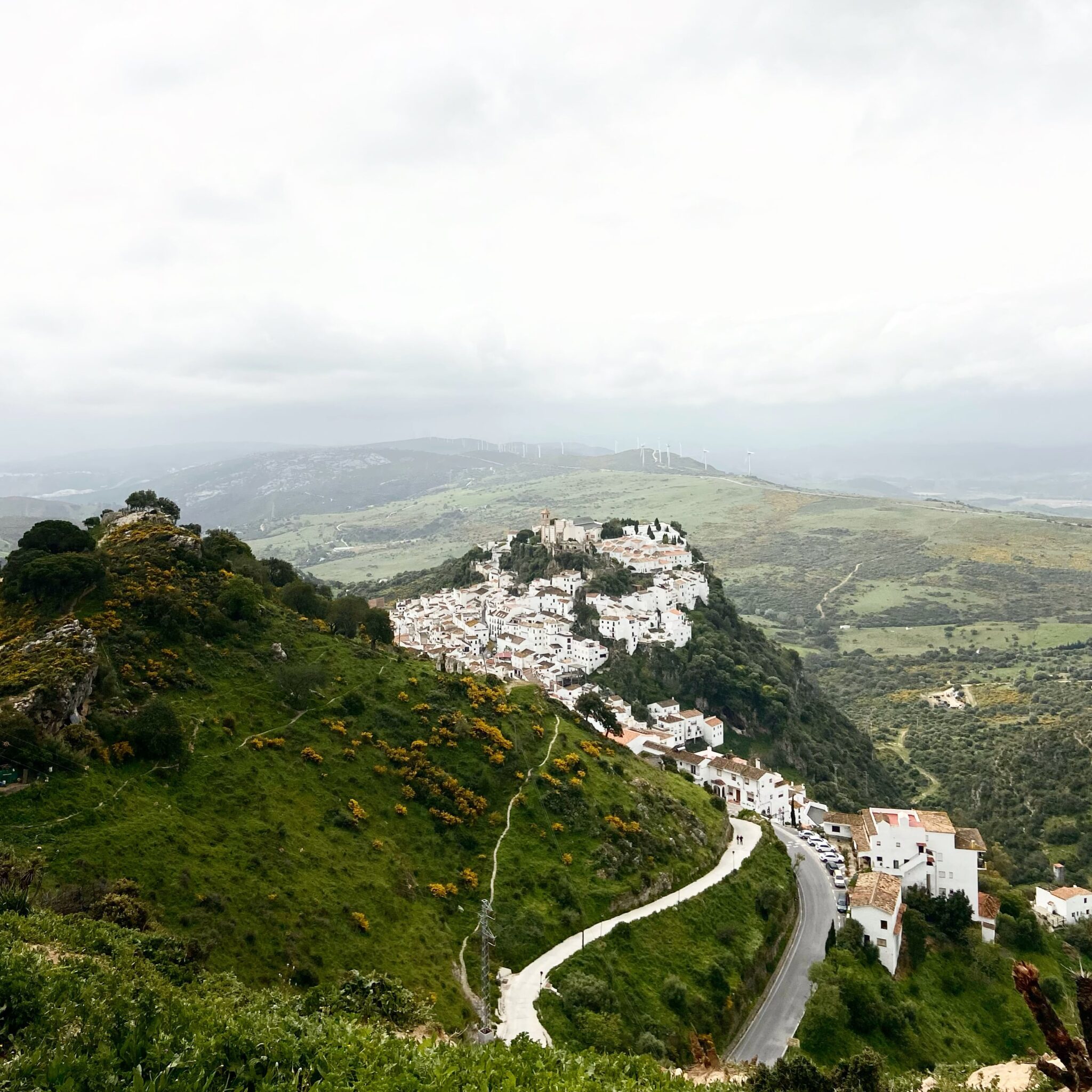The other day, an old friend whom I hadn’t heard from in a while, texted me: “Wait a minute, you’re living on a farm in Southern Spain?”
“That’s right,” I responded. I have to admit that, even after two-plus years, the unreality of it all still catches me by surprise…in a good way.
It wasn’t very long ago that my daily life was all about ‘final sketch review’ meetings in a downtown Los Angeles fashion studio; or stressful, 11th-hour marathons managing a sewing team to complete apparel samples in time for a New York trade show.
Cut to the present, where days on our Spanish “Finca” (farm) are taken up with collecting fresh eggs from the gallinas (hens); flipping two rooms for the next arrivals of our guests, picking fruit from our orchard; stripping bamboo for a new DIY structure; and–wait, what’s this? –there’s a problem with the solar panel inverters and the electricity may fizzle out overnight? I’d better have my handy better half check on that!
The story goes like this: I met my husband, Wilco, while we were both traveling abroad in southeast Asia, in 2013. I had quit my demanding, fast-paced fashion designer job because I was itching to get out of the L.A. work-grind bubble and see a world I was worried I’d never get a chance to explore. Not that long after we met and explored more of the far east together, Wilco eventually moved from his home in Rotterdam to Los Angeles, where we got married and worked hard for another five years.
Somewhere amid those years we seized upon the idea of running a small bed-and-breakfast. Aside from the adventure of it all, we saw it as an opportunity for a quieter, higher-quality life, with the freedom to travel more. A European destination made the most sense–with Wilco’s EU citizenship, it would be relatively easy to gain working and living status there as a married couple. Wilco narrowed our search down to southern Europe, as his biggest “must-have” was significantly better weather than his native Netherlands. So, we settled on the sunshine surrounding the Mediterranean.



In 2019, we condensed our stateside life into six boxes that we shipped off to the Netherlands for storage at Wilco’s family home. That kicked off what would be a solid year of traveling. The idea was to enjoy some well-earned vacation, but also to scope out what we considered sensible places to start our B&B. In the beginning, we had our hearts and minds set on Portugal. Although we didn’t end up there, one of the best months of my life was spent living in a converted sleeper van as we made our way down Portugal’s rugged but beautiful coast.
Nowadays, most of our guests ask us why we chose this rustic farm above Spain’s Costa del Sol to settle in. Simply put, we chose it based on a feeling. Or, I guess, you could call it intuition…
It was a Sunday in Tarifa, a small seaside village about an hour’s drive from the village of Casares, the outskirts of which is where our farm is located. We spent that memorable afternoon on a sunny terrace along the main street. We were sitting there sipping cervezas, people-watching as the village teemed with happy families engaged in their own Sunday leisure. A more broadened property search from there led us to the intersection of Cádiz and Málaga provinces. We’d never heard of Casares before that, but, in hindsight, it was nearly everything we were looking for. Our bed and breakfast dream finally had a home.
Perched on a dramatic hilltop, the white-washed, red-tile-roofed village of Casares overlooks the Mediterranean, which is just a few klicks down a winding, picturesque two-lane road. Elevated and completely surrounded by steep green hills and, though, often breezy, there’s a certain peacefulness to it. Will and I, along with our dog, Oscar, often spend a Saturday hiking one of several trails that end right in the village. We’ll enjoy a bebida (beverage) around the historic central fountain, the beating heart of the town. Local grandfathers–“abuelos”–line the benches in a noisy chat fest, their daily ritual. Kids kick a soccer ball to one another. Women queue up at the mini-market eager to buy a loaf or two of their amazing fresh-baked bread. These are the “small-town” moments that make me smile in agreement with our life-changing decision.





A short walk from Casares center is Restaurante Sarmiento, a modern culinary experience, maybe not so expected in the small village. Two brothers have taken their traditional, family-run restaurant and elevated it to offer local meat dishes that are aged and grilled to perfection. A house special includes succulent grilled goat that’s sourced from the herds roaming the mountains in your view. (In fact, Casares is also known for its goat cheese!) Sarmiento’s open air dining terrace offers the best view of Casares. From any glimpse, dining guests can observe a buitre (vulture) flying just above their eye level. A huge griffon vulture colony resides in the encompassing Sierra Crestellina Mountain range, the beautiful peaks that dominate the view. Did I mention that Morocco is in that skyline as well? The African port city, Tangier, is only a short ferry ride away, across the narrow Strait of Gibraltar at the mouth of the Mediterranean.
Casares is just a small, sweet dose of Andalucía’s charm. Another quality of this region that attracted us (and millions of other travelers) is the variety of things to see and do, all relatively close-by. A visit here offers lucky travelers a trifecta of enticements–the mountains, the sea, and the quaint villages–all rolled into one destination. The Costa del Sol remains a beachgoers’ paradise, dotted with lively bars, as well as bike and SUP rentals in every seaside town. (Estepona has become one of our favorites–don’t forget to put it on your list!) Leaving the beaches and winding up along the scenic mountain roads, travelers can spend their entire holiday visiting the many “pueblos blancos,” the whitewashed villages that Andalucía is so well-known for.
Our guests almost always plan a stop in the historic city of Ronda; as well as the artistic villages of Gaucín and Jerez de la Frontera, where flamenco music and sherry production are the orders of pleasure and business. Travelers also love to cross the Spanish border into nearby Gibraltar, which is just 35 minutes from Casares. Here, the British territory bustles like a displaced London borough, all situated under the famous, jurassic-era limestone rock that some consider one of the world’s great wonders…How’s that for contrast?
Our Finca, which we’ve dubbed “The Wild Olive Andalucía,” is an exciting new chapter of our life now. Situated in the Casares “campo” (countryside), our four-guest-bedroom farmstay is a lovely rural escape. We are completely off-grid, relying on the Spanish sun for electricity and the well for our water supply. Nearly 200 years old, the Finca’s build is a charming, romance-inducing bit of trivia that happens to involve a mega-measure of regular maintenance. It takes a different set of skills and presence of mind to live and work in this manner, forsaking a lot of “city-life” comforts and resources that I once took for granted. The challenge of operating the farm as a business and doing so in a country that’s largely foreign to us can be overwhelming at times. “Hablas Ingles?” Language barrier! And, as anyone can imagine, attempting to get our business up and running during the pandemic was tough. But in the end, it makes the compliments our guests from all over the world give us as they depart all the more meaningful. When we say farewell after their summer holiday and they tell us it was their best trip ever . . . it’s incredibly rewarding to think we’ve brought them this bit of joy with what we’ve created (with Mother Nature’s help, of course).
Apart from our busy days during the high season at The Wild Olive, life in Andalucía feels slower and more carefree. The cultural priorities, here, remain focused on family and relationships. Taking a long, leisurely paella lunch to really savor, then a siesta before heading back to the next task. Working to live and not the other way around. While our paychecks may not amount to what they used to, we have a different set of riches here. The benefit of free time to enjoy the stunning natural beauty of this region. And if, say, on a random Wednesday, after a trip to stock weekly groceries, we feel like popping into our favorite chiringuito (beach bar) for a beer and tapas, we have the freedom to do just that. The demands on us are still there, of course, but they’re different, and far less intense.
A common joke about the Andalusíans is that their favorite saying is “Mañana, mañana!” As in, no rush, relax, it will get done when it gets done. Perhaps it’s too difficult a culture shift for some to live here, especially those accustomed to the U.S.’s frenetic pace. In the time I’ve lived here, I’ve come to believe that the Spanish have really figured it out. “Mañana” has its roots in something meaningful and manageable, something worth striving to enjoy. Give it a try on your next holiday.



